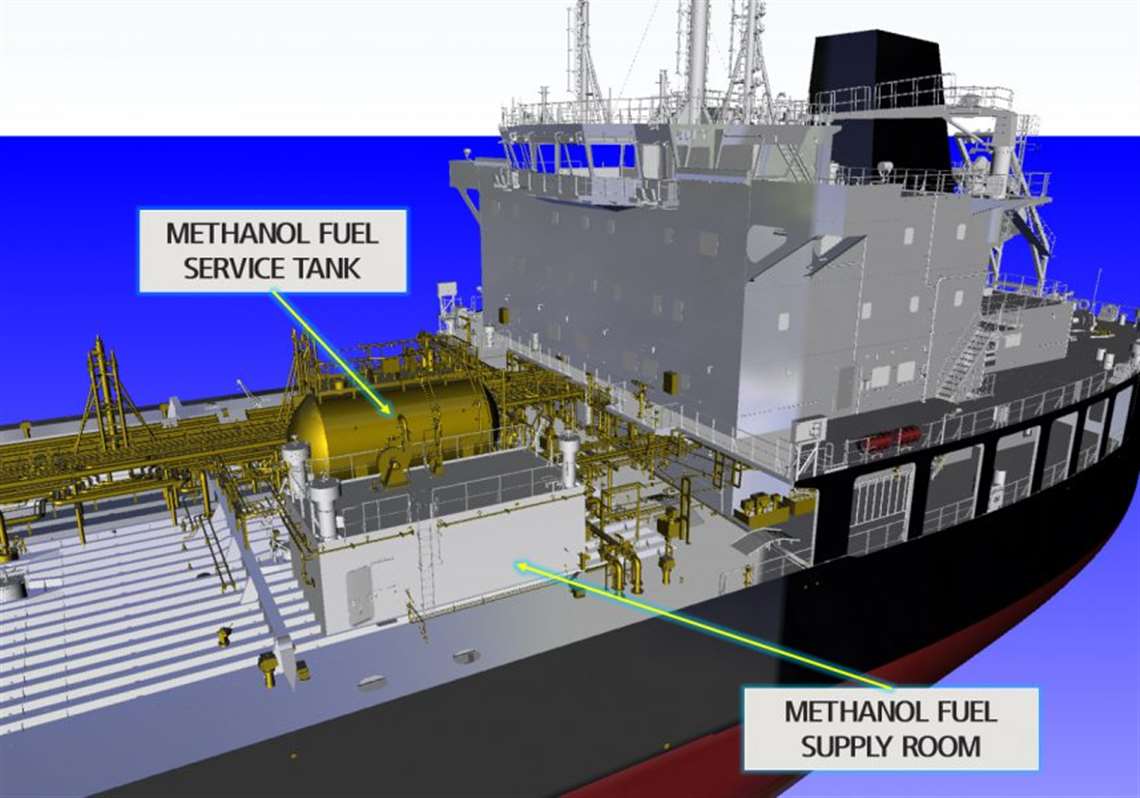Methanol-powered Tanker Gets Design Approval
09 December 2020

A coalition of maritime companies has collaborated on a Joint Industry Project to enable product tanker charterers and shipowners to utilize methanol as fuel regardless of the cargo carried.
Hyundai Mipo Dockyard, MAN Energy Solutions, and the Methanol Institute worked together to develop a design that meets all prevailing safety requirements with minimal loss of cargo capacity and low additional build costs, the group said in a news release. DNV GL reviewed the designs for the vessels in accordance with the relevant rules and regulations and provided technical advice and recommendations to help enhance the design development.
The resulting design – Low Emission Advanced Products Tanker (LEAP) – has been granted Approval in Principle by classification society DNV GL, which acted as verification body to the project, assessing and approving the design in conformity to its rules and the latest amendments to the IMO IGF Code.
The vessel has a service speed of 14.5 knots and an effective range of 17 400 nautical miles using methanol as primary fuel and an effective range of 21 900 nautical miles using very low sulfur fuel oil (VLSFO). Cargo capacity is 54 000 m3, a reduction of just 300 m3 compared to a diesel-only vessel, the group said.
The LEAP design has additional newbuild costs of just 10% compared to an additional CAPEX of 22% for LNG-dual fuel, and using Methanol as fuel would have daily CO2 emissions of 54.7 tonnes per day at service speed, compared to 64.7tpd for diesel. The ship would have an approximate 6% improvement in its EEDI Phase 3 rating compared to a diesel-only vessel.
The design uses two slop tanks of 2 600 m3 to store methanol as fuel, positioned aft of the cargo tanks, protected by a cofferdam, with the fuel supply system connecting to the engine room via an on-deck service tank. Methanol is bunkered by an independent manifold and the design includes tanks for VLSFO and MDO storage to provide complete operational flexibility.
“HMD is pleased to have provided initial and detailed design for the LEAP vessel design using the experience accumulated from successful dual fuel methanol carriers for numerous international owners,” said YH Chung, Head of Initial Design Department, Hyundai Mipo Dockyard. “This design results in an estimated cargo loss of 0.5% for a low construction premium, providing shipowners with the ability to build a low emissions vessel today.”
MAN Energy Solutions provided input to the arrangement of the fuel supply and propulsion system, based on application of its proven ME-LGIM two-stroke methanol-capable main engine. There is no significant additional ‘footprint’ for the methanol fuel system as the service tank, methanol pipelines and methanol fuel supply room are located on deck.
“Methanol ticks the boxes from an emissions point of view, with no sulfur, very low PM and carbon dioxide emissions around 15% lower than conventional marine fuel oil,” says Kjeld Aabo, Head of Marine and Offshore Sales, 2 and 4 stroke engines, MAN Energy Solutions. “To meet IMO NOx Tier III requirements, methanol can be blended with water which brings the ship into compliance without the need for expensive exhaust gas after treatment.”
DNV GL’s Approval Center verified the design in accordance with its rules and applicable international regulation including the latest amendments to the IGF Code which include guidelines on the use of methyl/alcohol fuels.
The Methanol Institute believes the next few years will be crucial ones for the adoption of fuels that can begin to have an impact on global carbon emissions from shipping. Huge investment will be required to produce renewable fuels and owners may have to demonstrate that they have taken steps to address their environmental performance in order to access fresh capital in the future.
“Governments, NGOs, policy-makers, academics and technical experts all agree that conventional Methanol provides a safe, clean and practical pathway to short-term emissions reductions,” says Chris Chatterton, Chief Operating Officer, The Methanol Institute. “This vessel design demonstrates that newbuild or conversion can be straightforward and cost-effective and extends the trading life of the asset as it can use renewable Methanol as more becomes available.”
POWER SOURCING GUIDE
The trusted reference and buyer’s guide for 83 years
The original “desktop search engine,” guiding nearly 10,000 users in more than 90 countries it is the primary reference for specifications and details on all the components that go into engine systems.
Visit Now
STAY CONNECTED




Receive the information you need when you need it through our world-leading magazines, newsletters and daily briefings.
CONNECT WITH THE TEAM












